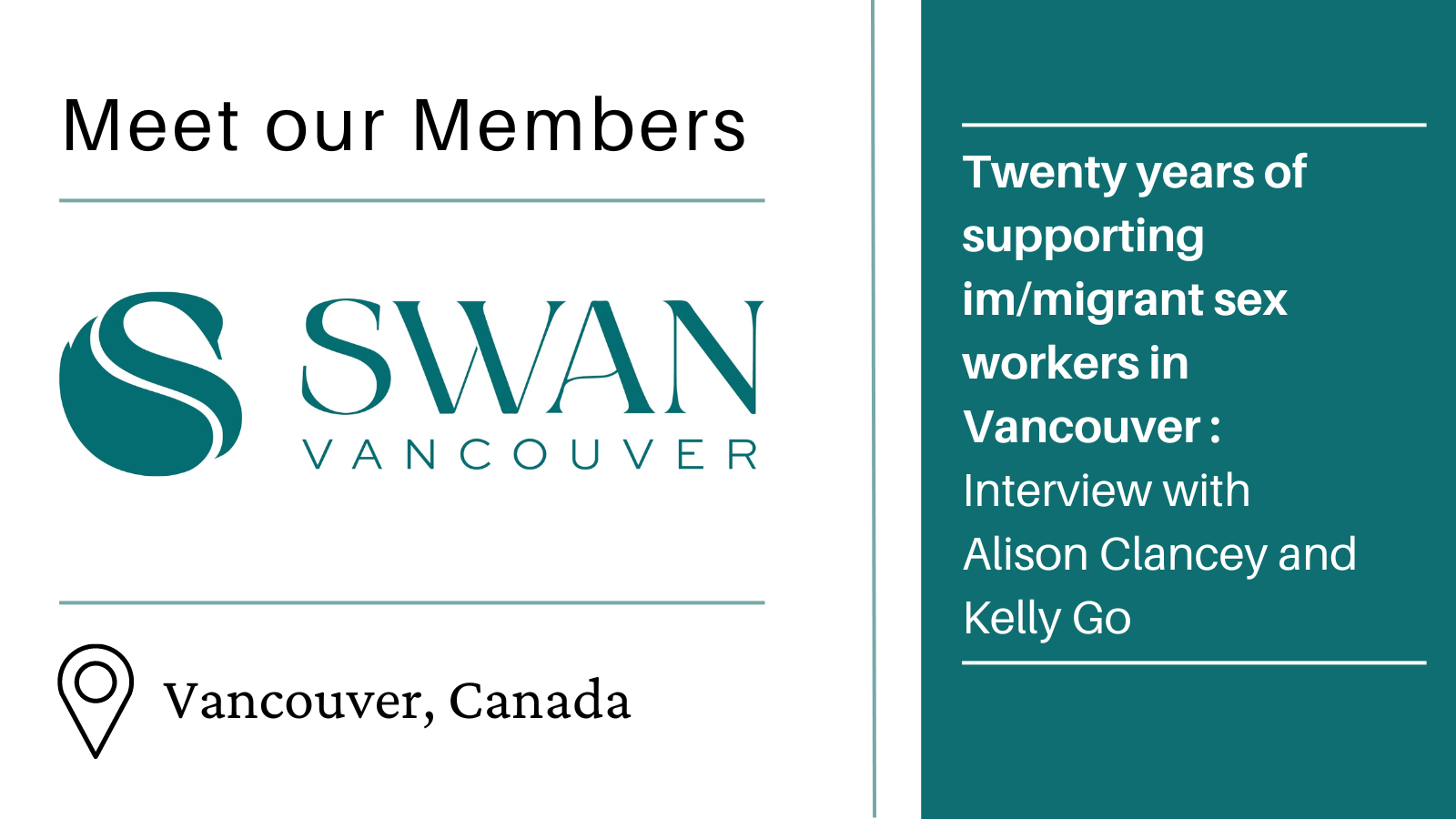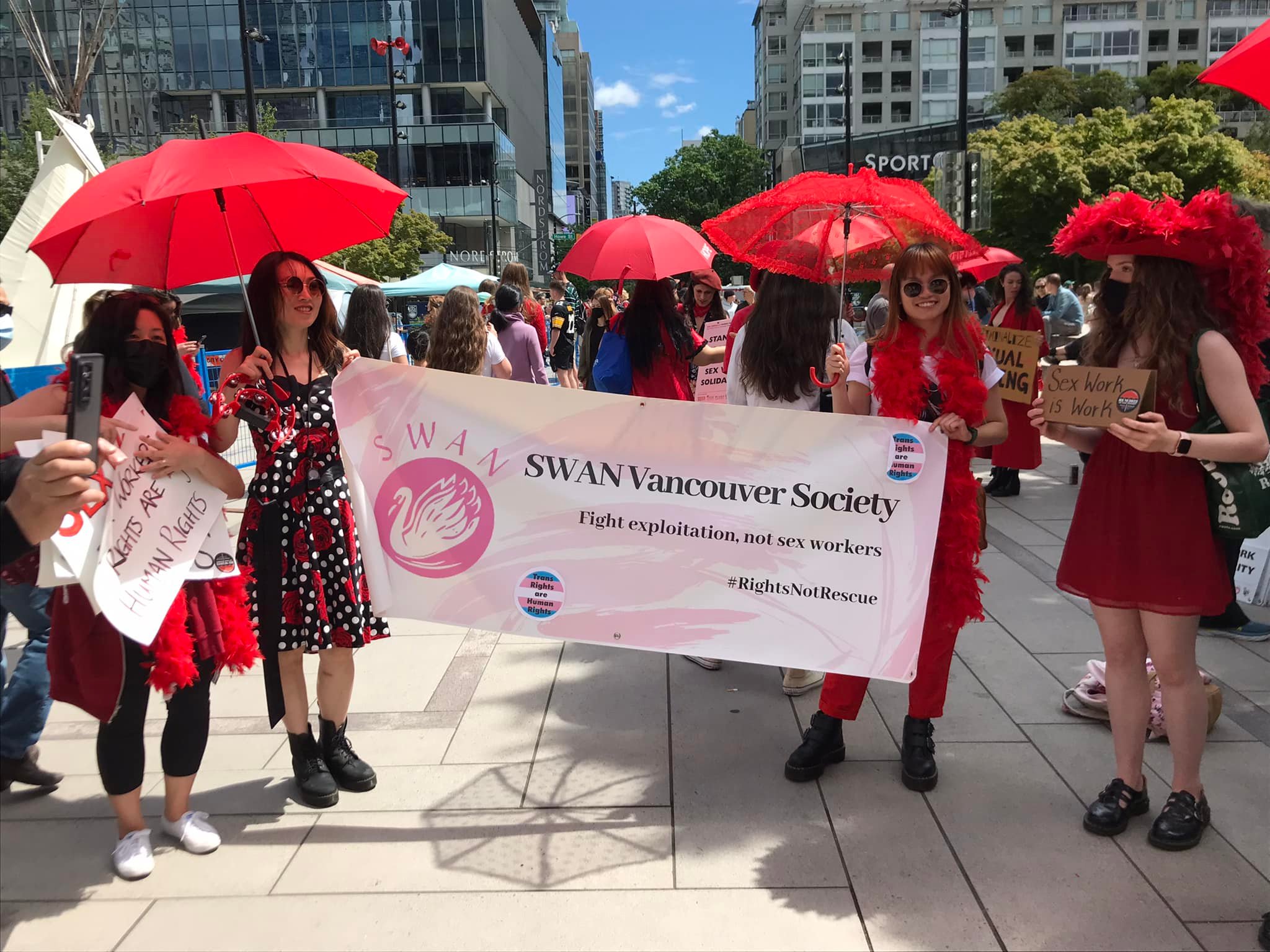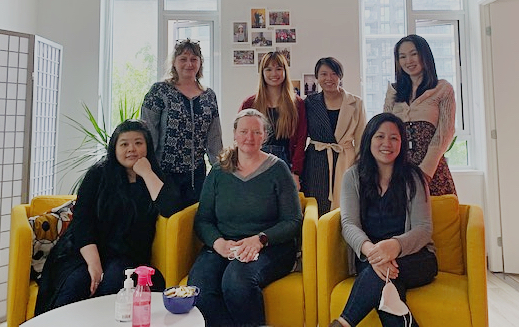Meet Our Members: Supporting Women’s Alternatives Network (SWAN)

Lee la entrevista en español aquí
SWAN Vancouver is a GAATW member in Vancouver, Canada. Emilia Cebrián from the GAATW Secretariat conducted this interview with Alison Clancey, SWAN’s Programs Director, and Kelly Go, SWAN’s Programs Manager, in July 2022 to better understand the organisation’s work and context.
Emilia Cebrián: Thank you, Alison and Kelly, for taking the time for this interview. Let’s start with a bit of history. When was SWAN founded and why?
Alison Clancey: SWAN was founded in 2002, so we are having our twentieth anniversary this year and that is very exciting. In the beginning, there was a pilot health outreach initiative with community nurses, and some women joined that health initiative to go to massage parlours where immigrant and migrant women worked in sex work to determine if they had access to healthcare; I think it was specifically an HIV project. When they went into massage parlours and met with the women, they determined that the issues that the women were addressing were much broader than health. Women wanted to know about safety, employment, immigration and a whole host of other issues, so from that initial outreach they realised that those outreach workers should come together and provide outreach on a regular basis. That is how SWAN started.
EC: Happy anniversary! Can you tell me, what is the difference between immigrant and migrant and why do you make that distinction?
AC: That is a really important question. We use the term migrant sex workers or migrant women to think of women who are temporary residents, may not have work or immigration status in Canada or they may be out of status, and immigrant women refers to those who have work status, permanent residency or have gained citizenship in Canada because the issues that they face can be quite different. That said, some of the issues the women face are the same, for example, stigma, discrimination, and exclusion, particularly around employment and immigration, but enforcement and the laws can be applied quite differently to the two groups of women.
EC: What are the main issues you work on, the main issues that your communities face?
AC: The issues that we work on are violence prevention and response, the harms of anti-trafficking, political advocacy and law reform in regard to both sex work and trafficking. On a systemic level, SWAN is actively challenging mainstream anti-trafficking discourses that encourage law enforcement actions that harm migrant and immigrant sex workers. We are also very active advocating for full decriminalisation of the sex industry, decriminalisation that does not leave migrant sex workers behind. If sex work was decriminalised in Canada, migrant sex workers would still be criminalised under the immigration prohibition on sex work.
Kelly Go: Because of the demographics of greater Vancouver, we primarily support Asian women who do sex work. The community that we support right now are mainly Chinese speaking, so we provide services in Cantonese and Mandarin, and while we support this specific group of im/migrant women who do indoor sex work, their experiences are very diverse. When SWAN first started, our name was ‘Sex Workers’ Action Network’, but we changed it in 2008 to ‘Supporting Women’s Alternatives Network’ because we wanted to ensure that we are including im/migrant women who do sex work but might not self-identify as sex workers, and ensure that we are not imposing that label on this very diverse community.
AC: Most of our services are offered in Mandarin and Cantonese, and we actually do very little frontline work in English. Our services continue to evolve as we consult with and receive feedback from the women. For example, the Online Outreach Programme that we started in 2015 was a result of feedback from the community, because up until then we had been doing outreach mostly in massage parlours. But many women with precarious immigration status were working in apartments and private residences, so we were not accessing a whole group of women who expressed that it was better if we did outreach with more privacy and confidentiality, not even meeting in person. So, we started our Online Outreach Programme. We connect with women through text message, email, WeChat or online groups so that they have more anonymity, and that was an example of a core programme that evolved over time based on women’s feedback.
KG: Our services are very low barrier. We never ask the women for their legal names or immigration status. When we receive a call, our response is solely based on what the women share with us and how comfortable they are.
 |
| Red Umbrella March for Sex Work Solidarity 2022 |
EC: SWAN runs really interesting, thought-provoking campaigns. Could you share some of the insights and learnings that you have gained through your campaigning initiatives?
AC: The conflation of trafficking and sex work is significant in Canada, and there are a lot of people in Canadian society who do not know that there can be a harmful side to anti-trafficking initiatives. So, a lot of people not knowing the distinction between sex work and human trafficking are actually engaging in disinformation and harmful actions to express concern for women in the sex trade, not realising that these actions can be harmful. So the first step is raising awareness that there are harms to these initiatives, because a lot of people hear about human trafficking and feel compelled to do something about it, not realising that their efforts can contribute to more enforcement and harmful federal laws that actually create situations where trafficking can thrive. But we have realised over the years what an uphill battle it is to raise awareness that there is a harmful side to anti-trafficking initiatives and the rescue industry.
KG: All of our campaigns require us to navigate the intersections between sex work and migration, class, race, and gender. It’s really complex and we cannot put it in a simplistic way, as that would not be ethical. But we still have to find creative ways of making easily-digestible campaigns.
EC: What are the main challenges that im/migrant sex workers and victims of trafficking are facing and the main dynamics around sex work and trafficking in the communities you support?
KG: One is that Canadian law views all sex work as trafficking, so even sex workers who are not in exploitative situations would be considered victims. If they report to the police but they have a precarious immigration status, it is very difficult for them to have a safe pathway to criminal justice, because immigration law prohibits non-citizens to engage in sex work, so that could lead to immigration issues. There is also this view of who is a valuable victim and who is not, and this is often enforced. We have worked with women who are trafficked and yet it is very hard for them to access the criminal justice system because maybe the perpetrator is a woman, and the system does not see that as fitting within a typical trafficking case.
AC: Mainstream community services are inaccessible and harmful not only to im/migrant sex workers but also to im/migrant sex workers who may be trafficked. We do not refer women to mainstream anti-trafficking services because they are created on very narrow and stereotypical understandings of trafficking that do not always take into consideration race, in particular, and they can be very paternalistic and informed by false narratives. Oftentimes, mainstream anti-trafficking services are not only inaccessible but also harmful to the women we serve. Those services don’t understand the nuances of the situations that the women who come to SWAN work and live in.
KG: From my experience, one thing that I see across the board is that women’s agency is never taken into consideration. There are women who might be victims of trafficking, and want to get out of that situation but also want to continue to work. There is no system to support that, and they would have to completely get out of the sex industry even though it is their work. They just want to get out of that exploitative situation but that is not respected.
EC: SWAN was part of our recent research project on socioeconomic inclusion of migrant women. Were there any insights or learnings from that research that you incorporated into your work?
AC: One of the action items that came out of that research was linked to the language barriers in order to work safely within the sex industry or choose other employment. A lot of women come here and perhaps their educational credentials from their countries of origin are not recognised. Another barrier could be that they have no Canadian work experience. So after that project, we started English classes for the first time ever, and we recently finished our second class.
EC: Are these classes online or in person?
KG: Classes are in person. We have them once a week, and it is a completely new programme. Because of the stigma on this community, it was very difficult for the women to come to our space for any other events, but with this one where we had great success. They are all very interested in taking this class. It is our first time hosting it and it went really well.
AC: It is also a community-building effort. Because there is so much stigma and isolation, we hope that through the English classes and other events that we are also offering now, we’ll build community to reduce stigma. A longer-term plan is to support advocacy among the women in a safe way, should they express that they want to engage in advocacy in the future.
EC: Anti-trafficking organisations are usually concerned with victims and it seems like we don’t know much about traffickers, or the people convicted of trafficking. Do you know anything about traffickers in Canada - who they are and how they operate?
AC: They often come from the same communities as some of the articles in the recent Anti Trafficking Review issue showed. In our situation, the criminalisation of sex work creates opportunities for unscrupulous individuals. If it was decriminalised and women had the same access to employment standards and occupational health and safety as other workers, then there would be less space for individuals to take advantage of them. Exploiters and traffickers are filling the space that is created by the criminalisation of sex work.
KG: Like Alison said, perpetrators are just using the laws that we have now and those gaps to operate, especially the immigration prohibition on sex work. That is the main state system that is making it possible for them to operate. Those who exploit say, ‘If you report me, then I will report you and you will get deported’.
AC: There are systemic vulnerabilities, but the laws and the immigration prohibition in particular were based on a racist understanding of women migrating for sex work, and looks at it as individual vulnerability, but that is not what we are dealing with at all. These women are extremely strong and resilient, and it is the system that creates the vulnerability for precarious employment. This also fuels those male-dominated professions as well, like policing and border services, and you have so many men looking through a racist and paternalistic lens and thinking ‘those poor women, I’ll be a hero and save them’.
 |
| Staff members |
EC: Can you tell me more about how you apply an anti-racist approach in your work?
AC: We are working with other sex worker rights organisations in our province to make their services more accessible. The sex work direct services can be quite different if you are serving racialised women, for example, how the laws, enforcement and trafficking indicators get applied. We work with other sex worker organisations to raise awareness through a racial lens.
KG: All of the work that we do is through this anti-racist lens, because race is at the heart of what we do. We talked about challenging the conflation of trafficking and sex work, and that conflation itself comes from a very racist perspective. In terms of training, like Alison said, we go to other sex worker support organisations because the view of seeing im/migrant sex workers as trafficked is quite prevalent, even within the mainstream sex worker rights community.
AC: An anti-racist lens is also embedded in our organisational structure. Because very little of our work is done in English, we need to make sure that we are hiring people from the communities that the women are from. If we do not have language accessibility and cultural connections, we would not be able to do the work that we are doing, and that is reflected at all levels in our organisation, from volunteers, to staff, to the Board.
EC: I know that some Latina women participated in your research on socioeconomic inclusion that we talked about earlier. Is this a community that you are starting to support as well?
AC: Outside of women from East Asia, we do not always have the language capacity. So, for many years we did work with Iranian women who did sex work because we had members at that time who could speak Farsi. We do not have anyone in our staff or Board who speaks Spanish right now, so unfortunately, our services to Latina women have been limited to those who can speak English. Compared to Toronto, Vancouver probably has less diversity. And when it comes to massage parlour work, it is predominantly Chinese women that are working there, so that is why we have evolved into Mandarin and Cantonese speaking services, and I think that we are meeting the greatest need with our trilingual services.
EC: I don’t have any other questions. Is there anything you would like to add?
AC: We are at a really exciting time in our history. We have grown exponentially over the last couple of years, and we are connecting with women in ways that we have never been able to before. Kelly talked about the English class and women dropping in to our space. We have always been an outreach service, and I don’t know if something shifted with COVID-19 or if it is that we have more staff capacity, or a combination of both, but we are evolving into a different kind of service with women using our space much more and feeling safer and more comfortable to come in. We are really excited about that community building aspect of our work, and we have many other important initiatives happening. We have a media discourse project which will aim to educate journalists about anti-trafficking reporting because at the moment there is so much disinformation. It is a really exciting time at SWAN on our twentieth anniversary.
Thank you for reaching out, and we are happy to talk to GAATW any time 😊

